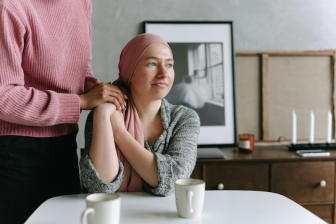How we safely transport your medicines: An interview with our logistics team
Last updated: 01 July 2020
You can legally access new medicines, even if they are not approved in your country.
Learn how
Our logistics team is responsible for delivering medicines to patients anywhere they may be. Every medicine is treated with extra care to ensure its safe and timely delivery. With their expertise, we have been able to successfully deliver medicines to 85 countries and counting.
We sat down with our logistics team and asked them a few questions regarding their daily tasks and experience at everyone.org. If you’re curious to find out how your medicine is delivered, keep on reading:
1- Can you tell us a little bit about yourselves?
Bart
I am a 50 year old Amsterdammer who loves helping patients access their medicines. I worked in some of the biggest multinational logistics companies for more than 25 years. This allowed me to build a unique logistical expertise and a solid network of global partners. You can count on me to almost always find a solution to any logistical problem.
Soo
I moved to Amsterdam from South Korea 2 years ago. I just recently joined everyone.org after working for three years in the field of life sciences specializing in the manufacturing of medicinal products and equipment. I have a deep understanding of logistics in the field of healthcare and I hope to help as man y patients as possible to access their medicine.
2- Can you tell us a little about what you do for patients at everyone.org?
Bart
We consider every medicine delivery as its own business case. Everytime we need to deliver a medicine to a patient, we have to determine three important things: the local documentation requirements, the ideal shipping route, and the right local carrier. The delivery differs with each destination and each particular medicine.
Soo
Couldn’t agree with Bart more. We really try our best to ensure that the shipment is perfectly organised. For example, some medicines require temperature controlled shipping. For those types of shipments, we always try to organise data loggers so that our patients can rest assured that their medicine has been kept at the right temperature throughout its journey.
3- What is the most difficult part of your job?
Bart
What we do is very unique and complex. The majority of people out there don’t know that they can legally import a medicine that is not yet approved in their country of residence. On the logistics side, we have to explain the named patient regulation to customs and local authorities for every shipment. I am known in the company for my “famous” phone calls. You can basically always find me talking loudly to local authorities on a regular basis. They often have no knowledge regarding the right for patients to import their medicines for personal use. We often write a letter explaining the purpose behind the shipment addressed to the local authorities.
Soo
The most difficult part for me is the unpredictability. Because so many elements are in play for every shipment, we are always on standby. Should any questions come up from the customs authorities or from our delivery partners for example, we are always ready to solve it. We have been very successful in managing all these different stakeholders but sometimes it takes a little bit of extra effort to solve a complex case.
4- What is the most satisfying part of your job?
Bart + Soo
When we receive an update from a patient who has received their medicine in due time and that the treatment has helped them in some way. This makes all of our efforts completely worth it!
5- What has been the most challenging case you have worked on?
Bart
The most difficult cases are those for new territories for time sensitive medicines. Many times, everyone.org is the last resort for patients who have tried all of their local protocol. This means that we have the extra responsibility to deliver in due time to a new country with its own regulations.
Soo
I have not had any crazy challenges yet as I am still new! But I can say that we are always going the extra mile, even if the medicine is delayed from our supplier’s side. We often try to find a way to make up for the lost time.
6- What would you like patients to know?
Bart
What we do is really unique and local authorities are often unaware. You have the legal right to import a medicine you need. You can always count on us to take care of the entire process for you.
Soo
In case the medicine cannot be delivered to a patient’s country, I’d like patients to know that we do offer the option for them to come pick up the medicine from our partner pharmacy in Amsterdam. I would also like them to know that we do our best and we try our hardest for every single medicine. We check and double check that the shipment can be done smoothly. This is why we require so many documents sometimes to ensure that any delays will be as little as possible.




